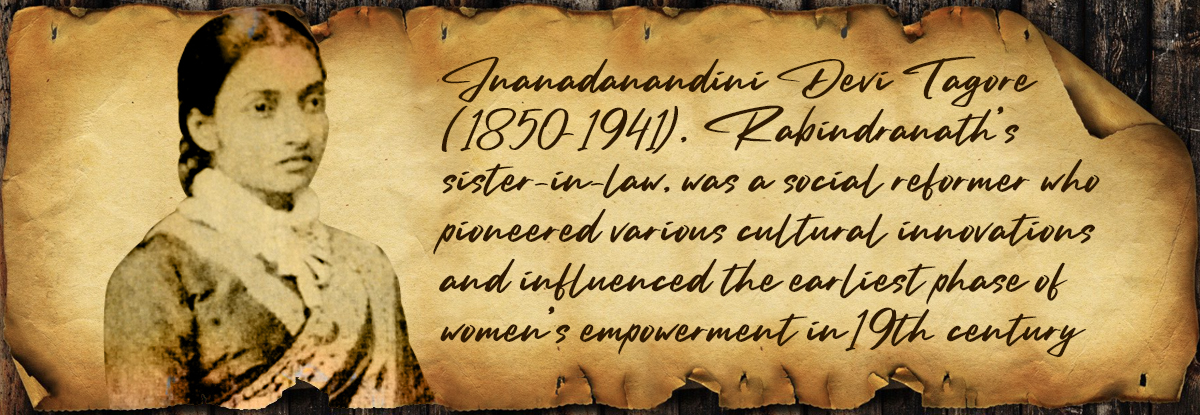JNANADANANDINI DEVI
JNANADANANDINI DEVI TAGORE (1850-1941), RABINDRANATHʼS SISTER-IN-LAW, WAS MARRIED TO SATYENDRANATH TAGORE, A SCION OF THE JORASANKO TAGORE FAMILY. SHE WAS A SOCIAL REFORMER WHO PIONEERED VARIOUS CULTURAL INNOVATIONS AND INFLUENCED THE EARLIEST PHASE OF WOMENʼS EMPOWERMENT IN 19TH CENTURY BENGAL
Jnanadanandini Devi was born in Jessore, Bengal Presidency, and was married at the young age of seven to Debendranath Tagoreʼs second son, Satyendranath, in 1857. In contrast to her idyllic life in Jessore, she found herself confined to the strict purdah observed by the Tagore household at Jorasanko.
Upon Satyendranathʼs return from England in 1864 as the first Indian member of the Civil Service, Jnanadanandini went to live with her husband in Bombay. While there, she socialised in European circles and partly adapted to English customs. This shift in social role required her to dress accordingly, and she found the traditional Bengali style of wearing the sari too unwieldy. She improvised upon the sari worn by Parsi women and created her own style. She began draping the pallu/aanchal over her left shoulder rather than the right, like the Parsi sari, leaving the right hand free for courtesies and other social graces of the time. This style is still followed by women all over India.
While in Calcutta, breaking the customs of the upper-caste household, she accompanied her husband to a Christmas party hosted by the Viceroy in 1866. Prasanna Coomar Tagore (Pathuriaghata branch of the family), who was also among the invitees was deeply outraged by Jnanadanandiniʼs boldness and left the viceregal palace in shock. Her father-in-law, Debendranath Tagore did not take kindly to her independent spirit either. Jnanadanandini left Jorasanko in 1868 to live by herself in a mansion on Park Street. In 1877, a heavily pregnant Jnanadanandini Devi set sail for England with her three children. At a time when an Indian woman crossing the seas was unheard of, her fortitude created a social sensation. Satyendranath joined her in England with the onset of his furlough in October 1878, along with his younger brother Rabindranath Tagore who was nurtured by her.
After Swarnakumari Devi, Jnanadanandini was the other among the women of the Tagore family to participate actively in the family’s rich literary ambiance. Upon her return from England in 1880, she began to write for Bengali journal Bharati. In 1881, Jnanadanandini published an article called Ingrajninda O Deshanurag (Criticism of the British and Patriotism), calling for the establishment of an all-India organisation that would be able to reach even the remotest district towns. This was four years before the Indian National Congress was established! In 1885, Jnanadanandini started Balak, the first children’s literary Bengali magazine to which Rabindranath contributed. She also wrote a couple of children’s plays – Takdumadum and Saat Bhai Champa.

